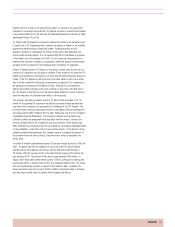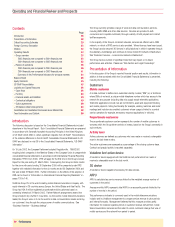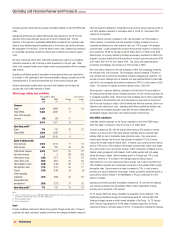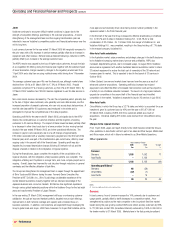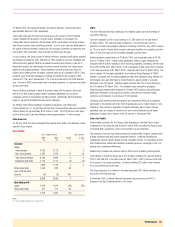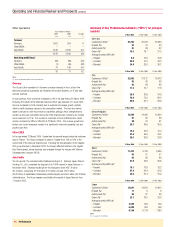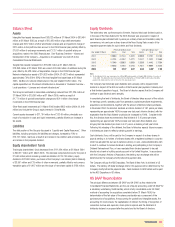Vodafone 2005 Annual Report Download - page 37
Download and view the complete annual report
Please find page 37 of the 2005 Vodafone annual report below. You can navigate through the pages in the report by either clicking on the pages listed below, or by using the keyword search tool below to find specific information within the annual report.
Performance |35
2004 financial year compared to 2003 financial year
Turnover
Turnover increased 10% to £33,559 in the 2004 financial year, resulting from organic
growth (10%) and changes in exchange rates (4%), partially offset by the impact of
acquisitions and disposals. The foreign exchange impact primarily arose due to a
stronger euro. The impact of acquisitions and disposals resulted mainly from the
disposal of Japan Telecom.
Mobile telecommunications
Years ended 31 March
2004 2003 Change
£m £m %
Service revenue:
– Voice 23,708 21,201 12
– Non-voice 4,541 3,622 25
Subtotal 28,249 24,823 13
Equipment & other 3,666 3,024 21
Total mobile revenue 31,915 27,847 15
The principal component of the increase in turnover from mobile telecommunications
arose from service revenue growth of 13%, driven primarily by growth in the Group’s
controlled customer base, which increased by 9% over the 2003 financial year.
ARPU for the year ended 31 March 2004 was up 4% in Italy and 8% in the UK, and
down 7% and 1% in Japan and Germany, respectively, compared with the year ended
31 March 2003. Total outgoing voice usage in controlled mobile businesses increased
by 11% to 154.8 billion minutes for the year ended 31 March 2004, although the
effect on ARPU was partially offset by tariff reductions and regulatory intervention.
Lower termination rates, resulting from regulatory changes, reduced service revenue by
an estimated £0.3 billion in the year.
Another key driver of the growth in service revenue was the continued success of the
Group’s data product and service offerings. Revenue from data services increased 25%
to £4,541 million for the year ended 31 March 2004 and represented 16.1% of service
revenue in the Group’s controlled mobile subsidiaries for the twelve months ended
31 March 2004, compared with 14.5% for the 2003 financial year. SMS revenue
continued to represent the largest component of both the level of and growth in data
revenue. Non-messaging data revenue increased to 4.2% of service revenue from
3.6% in the prior financial year as a result of the increased focus on providing value-
added services, particularly through Vodafone live!, the Group’s business offerings and
the increased penetration of data services into the Group’s customer base.
Mobile equipment and other turnover increased 21% to £3,666 million, due to revenue
from non-Vodafone customers acquired as a result of the acquisition of service
providers in the UK and increased acquisition and retention activity. Excluding this
revenue, mobile equipment and other turnover increased slightly as a result of higher
gross connections and upgrades.
Non-mobile businesses
Turnover from other operations decreased by 40% to £2,128 million in the year ended
31 March 2004, principally as a result of the deconsolidation of Japan Telecom from
1 October 2003, and the disposal of the Telematik business by Arcor in the previous year.
Operating loss
After goodwill amortisation and exceptional items, the Group reported a total operating
loss of £4,230 million for the year ended 31 March 2004, compared with a loss of
£5,451 million for the previous year. The £1,221 million reduction in the total
operating loss arose as a result of a £228 million credit in respect of exceptional
operating items in the year ended 31 March 2004, compared with an expense of £576
million in the prior year, and a £1,568 million increase in operating profit before
goodwill amortisation and exceptional items, partially offset by a £1,151 million
increase in the goodwill amortisation charge. The charges for goodwill amortisation,
which do not affect the cash flows of the Group or the ability of the Company to pay
dividends, increased by 8% to £15,207 million, principally as a result of the impact of
foreign exchange movements.
Expenses
Years ended 31 March
2004 2003
% of turnover % of turnover
Direct costs(1) 39.9 38.9
Operating expenses(1) 22.5 24.1
Depreciation and amortisation(2) 13.6 13.6
Notes:
(1) Before exceptional items
(2) Before goodwill amortisation
Direct costs include interconnect costs and gross acquisition and retention costs as
well as other direct costs. Operating expenses include payroll costs and other
operating expenses.
The increase in direct costs as a percentage of turnover was principally due to an
increase in the proportion of acquisition and retention costs, primarily following the
acquisition of a number of service providers in the UK. Acquisition and retention costs
net of equipment revenue as a percentage of service revenue, for the Group’s
controlled mobile businesses, increased to 12.6%, compared with 12.3% for the
comparable period. This was partially offset by the disposal of Japan Telecom.
The principal reason for the improvement in operating expenses as a percentage of
turnover was the maintenance of network operating costs at a similar level to the
previous financial year, despite the growth in customer numbers and usage. Operating
expenses as a proportion of turnover also benefited from the disposal of Japan
Telecom.
Depreciation and amortisation charges, excluding goodwill amortisation, increased by
10% to £4,549 million from £4,141 million in the comparable period. The launch of
3G services in a number of countries resulted in approximately £0.3 billion of additional
depreciation and amortisation in the current year as 3G infrastructure and licences
have been brought into use.
Goodwill amortisation
Retranslating the goodwill amortisation charge for the year ended 31 March 2004 at
the average exchange rates applicable for the year ended 31 March 2003 would have
reduced the charge by £965 million to £14,242 million, with a corresponding reduction
in total Group operating loss.
Exceptional operating items
Net exceptional operating income for the year ended 31 March 2004 of £228 million
comprises £351 million of recoveries and provision releases in relation to a contribution
tax levy on Vodafone Italy, net of £123 million of restructuring costs principally in
Vodafone UK. Net exceptional operating charges of £576 million were charged in the
year ended 31 March 2003, comprising £485 million of impairment charges in relation
to the Group’s interests in Japan Telecom and Grupo Iusacell, and £91 million of
reorganisation costs relating to the integration of Vizzavi into the Group and related
restructuring.
In accordance with accounting standards the Group regularly monitors the carrying
value of its fixed assets. A review was undertaken at 31 March 2004 to assess
whether the carrying value of assets was supported by the net present value of future
cash flows derived from assets using cash flow projections for each asset in respect of
the period to 31 March 2014. The results of the review undertaken at 31 March 2004
indicated that no impairment charge was necessary.




